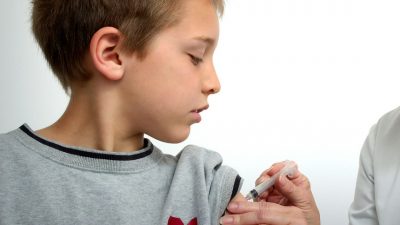
By Cian Molloy - 02 August, 2020
There is a moral duty to avail of vaccines when available, say the bishops of England and Wales in a document that aims to clarify the Catholic position on vaccination and that argues for the ethical sourcing of future vaccines.

A boy receiving a vaccination injection (Pic CBCEW).
The three-page document has been published jointly by Bishop Paul Mason of Southwark, who is lead bishop for healthcare, and Bishop John Sherrington, auxiliary in Westminster, who is lead bishop for life issues. The document has been published as work continues across the world to develop a vaccine to combat COVID-19.
Their statement says: “The Catholic Church strongly supports vaccination and regards Catholics as having a prima facie duty to be vaccinated, not only for the sake of their own health but also out of solidarity with others, especially the most vulnerable.
“We believe that there is a moral obligation to guarantee the vaccination coverage necessary for the safety of others. This is especially important for the discovery of a vaccine against COVID-19.”
Vaccination is a topic that is perhaps more controversial than it should be because of the disgraced British doctor, Andrew Wakefield, who fraudulently claimed that there was a link between the MMR vaccine and autism.
Concerns have been raised by some about potential side effects of vaccination, the two English bishops acknowledge, before echoing the words of a 2017 document published by the Pontifical Academy for Life, which commented: “From the clinical point of view, treatment with vaccines, despite the very rare side effects (the events that occur most commonly are mild and due to an immune response to the vaccine itself), is safe and effective. No correlation exists between the administration of the vaccine and the onset of autism.”
Additionally, in the United States especially, some pro-life supporters refuse to use vaccines because they were developed using cell cultures gathered from aborted foetuses in 1961.
“The Church is opposed to the production of vaccines using tissue derived from aborted foetuses, and we acknowledge the distress many Catholics experience when faced with a choice of not vaccinating their child or seeming to be complicit in abortion,” say Bishops Mason and Sherrington..
“Nevertheless, the Church teaches that the paramount importance of the health of a child and other vulnerable persons could permit parents to use a vaccine which was in the past developed using these diploid cell lines.”
Indeed, the two English bishops point to a situation where lack of vaccination could pose a risk to the life of the unborn.
If a pregnant woman, for example a teacher in a school, comes into contact with unvaccinated children, unfair and complex moral decisions may be imposed upon her, including whether it would be safe for her to work during her pregnancy. Exposure to unvaccinated children could incur serious consequences, the gravest of which include a threat to the lives of the mother and her unborn child.
The church distinguishes between the present unethical sourcing of vaccines and the use of historical cell-lines which were derived from aborted foetuses in the 1970s, the bishops say.
“Human society has often benefited from the wrongs done in the past for which we must repent. We live with the benefits of very questionable medical experimentation. For example, Edward Jenner, who invented vaccination, conducted research by injecting an 8 year-old boy with cowpox followed by smallpox. While today such experimentation would be unethical by any standards, we wouldn’t deny life-saving vaccination because of its dubious historic provenance.
“We encourage Catholics to commit to protecting the most vulnerable in our society, one method of which is effective vaccination.”